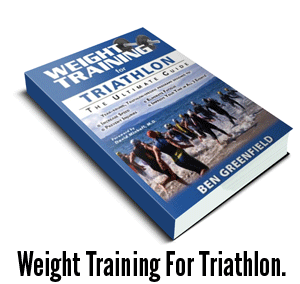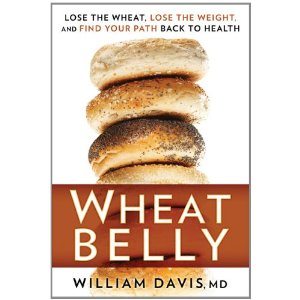December 28, 2011
Click here for the full written transcript of this podcast episode.
Do you have a future podcast question for Ben? click Ask a Podcast Question at the bottom of this page, Skype to “pacificfit” or scroll down on this post to access the free “Ask Ben” form…
In this December 28, 2011 free audio episode: “The Shocking Truth About Wheat” with Dr. William Davis. Also: fibre and fat, ankle weights for cycling and running, the Ben Greenfield food pyramid, l-arginine for performance, juicing, shin pain, achilles tendinitis, joint pain, and simethicone.
Remember, if you have any trouble listening, downloading, or transferring to your mp3 player just e-mail [email protected] And don't forget to leave the podcast a ranking in iTunes – it only takes 2 minutes of your time and helps grow our healthy community! Just click here to go to our iTunes page and leave feedback.
—————————————————–
Special Announcements:
Coming in 2012 – We'll be splitting up the podcast episodes into two separate sections: the Q&A with Ben Greenfield and the Featured Topic with special guests!
Wednesday, January 11, at 6pm PST: Join Ben Greenfield to ask your questions about the Tri-Ripped triathlon training program – learn how to swim, bike and run lightning fast, and have the ultimate triathlon body! Mark your calendar and attend for free at www.ustream.tv/channel/ben-greenfield-fitness.
 Weight Training For Triathlon – a cutting-edge, step-by-step gym workout guide to developing swim, bike and run power and is now available on: Barnes & Noble Nook, Amazon Kindle and iTunes.
Weight Training For Triathlon – a cutting-edge, step-by-step gym workout guide to developing swim, bike and run power and is now available on: Barnes & Noble Nook, Amazon Kindle and iTunes.
The BenGreenfieldFitness gear and clothing store – is now LIVE! Click here to get triathlon uniforms, tech pants and coat, hats and more all emblazoned with Ben Greenfield's “Fire & Water” tattoo!
Support the Leukemia and Lymphoma Society and Brock's “goofy” marathon(s) by making a donation at bit.ly.goofybrock.
—————————————————–
News Flashes:
- Yes, even with minimal rest periods between sets, you can still build significant muscle.
- The more endurance training you do, the worse your resistance training results.
- Exercise helps you make bone cells instead of fat cells!
- Here’s a reason to get good sleep if you’re injured or after hard workout.
- If you’re used to eating breakfast, then not eating it can really mess up calorie consumption later in day.
—————————————————–
Featured Topic: The Shocking Truth About Wheat
In this featured topic, Ben interviews Dr. William Davis author of Wheat Belly. Dr. Davis is a preventive cardiologist whose unique approach to diet allows him to advocate reversal and prevention of heart disease, and was also a guest on a podcast episode #60, “Why Do Healthy People Have Heart Attacks”.
During the interview, you'll learn:
– Why you're not eating the same kind of wheat your ancestors ate…
– Whether wheat bread is really better than white bread…
– If wheat is ever OK to eat and if so, when…
– Good substitutes and alternatives for wheat…
– …and much more!
—————————————————–
Listener Q&A:
Raminta asks:
How does fibre help with losing fat? Is fibre that has been pureed equally effective as it is in its original form? For example – pureeing vegetables for soup as opposed to raw vegetables, or blending fruit into shakes?
Christian says:
What are your thoughts on doing cycling and running drills with ankle weights on? Will this speed up skill acquisition and neuromuscular development?
Chuck says:
Interesting discussion about the food pyramid of Dr. Weil (Episode #174). Maybe you could discuss what the Ben Greenfield food pyramid would look like? Also, have you seen the Bulletproof diet guidelines from the www.bulletproofexec.com and what are your thoughts on it?
Eric asks:
What is your opinion of l-arginine as a supplement? Googling around for information on NO and supplements that might help Nitric Oxide production, I quickly found l-arginine, and specifically “ProArgi~9+”. They make some pretty bold (and yet vague) claims about helping everything from heart disease to endurance performance. What a coincidence – if I can get a boost in performance and help with any potential heart disease down the road – sounds like a no-brainer. Do you know of any studies that focused specifically on the effects of l-arginine on performance? Back when I was lifting a lot of weights, we often took amino acid tablets that contained l-arginine (and two or three others), is there any benefit to something like ProArgi-9, versus regular amino supplements? I did talk with my doctor on l-arginine – he did not feel that there was any significant risk, and since there were some potential benefits. It would be fine to give it a try.
~ In my response I mention Citruvol and Nitroceps from Millennium Sports.
Ron Starrett says:
My wife and I just got a juicer after watching the documentary “Fat, Sick & Nearly Dead”. My wife is mainly interested in the “Reboot” program the subjects in the movie are doing. As an ultrarunner (training for a 100 miler) and endurance athlete, I am curious how I can use this tool to increase my fitness nutrition. Any suggestions on certain juice recipes or combinations to try? Or about nutrient timing?
Listener Tony B. asks:
I have a question regarding shin pain: I run about 20-25 miles a week and when I run I feel fine, but afterwards my shins are very tender to the touch. I'm wondering what I can do to alleviate the pain.
~ In my response to Tony, I recommend www.marathondominator.com
Samantha asks:
I get Achilles tendonitis on and off, year-in year-out. How can I avoid it in future? What exercises can strengthen this area? I'm from the UK so a lot of the products/supplements you suggest are not available.
Shane says:
I just completed my first Ironman 70.3 and wanted to say thanks to you. All your great advice definitely helped me get through the race. My question is about how to prepare for the physical stress and fatigue of longer races. During my recent Ironman 70.3 I felt great until the second half of the run when the joints in my knees and feet started to hurt. I had plenty of gas left in the tank and my muscles felt fine, the only thing that held me back was the joint pain. How can I prepare my body to cope with this better? My training consisted of lots of high intensity interval work as well as a longer ride (60 miles) or run (6-8 miles) each week.
~ In my response to Shane, I mention Capraflex.
Skip's question:
I have heard some people suggest using “GasEx” (active ingredient is simethicone) for gas issues during an Ironman. Is this generally a good solution for people? My case is different than most so more details are necessary – My large intestine was surgically removed due to severe ulcerative colitis and a “pouch” was created with the end of my small intestine. My “plumbing” is connected like everyone else but my capacity to store waste and gas is severely limited. Also, due to my altered plumbing, I cannot just pass gas like everyone else because I'll lose more than just gas. Is simethicone a reasonable solution or do you have other suggestions? Does this chemical raise other issues or limit performance?
Closing music from “The Devil Went Down East Hastings” by Brock Skywalker.
Available on iTunes or at CD Baby.
Prior to asking your question, PLEASE be considerate and do a search in upper right hand corner of this website for the keywords associated with your question. 90% of the questions we receive have already been asked and answered here at BenGreenfieldFitness.com!
====================================== ======================================
Brand new – get insider VIP tips and discounts from Ben – conveniently delivered directly to your phone! Just complete the information below…
| First Name | |
| Last Name | |
| Cell # (1+area code): | |



Hi Ben– thanks for your podcasts! So informative. I do have a question– I just checked out the 2 supplements you recommended Citruvol and Nitroceps from Millennium Sports. Which I would like to do — but, which should I try? Do you ever use both together? Will these benefit females as well as males?
I am a female cat 2 bike racer.
Thanks!
Marni
Enjoyed the podcast on wheat. It made me kind of sad. I use coconut flour to replace wheat flour in a lot of my baked goods, it's great in cookies and muffins. I also use nut flours like almond meal (I do soak my nuts first) to replace wheat flour. I am curious about flours like oat (which is gluten free unless processed in a plant that also processes wheat) and quinoa flour. Maybe quinoa has not been changed by anyone yet! As far as cheese cake goes, where's the wheat in that? The crust? Just use coconut flour or nut flour in the crust.
Can you help me get the right web address for the article on achilles as posted by guirrillarace
http://yaroslavvb.com/papers/alfredson-heavy.pdf
Sorry. A comma seems to have gotten in the way in my first post.
I should also add that this regimen calls for 12 weeks of 3×15 reps of two exercises twice a day, so it can seem like a lot to bear. The only time that I have had AT, I actually took one week off from running and did the exercises. I then did a week at 70% of usual mileage while continuing the exercises, and then the next week I returned to 100% of mileage and continued the exercises for two more weeks. This was a bit over a year ago. Now, I just do the exercises somewhat regularly, and I will do them as recommended if I feel any problems with my achilles. I have not missed a run because of AT in about 18 months. As well, I had a client who came to me a few months ago because he had been dealing with AT for a few months and had not been able to run. After 12 weeks of completing the two different exercises once a day (he would not do them twice a day), he has had a couple of pain free runs. Good luck.
With regard to achilles tendonitis: As a running coach and personal trainer, I have found great success with the eccentric calf strengthening exercises outlined in this article, http://yaroslavvb.com/papers/alfredson-heavy.pdf, from the American Journal of Sports Medicine. There are other articles out there that validate this treatment plan (but this is the only article I have found that is free and contains pictures of the exercises). In fact, studies show time and again that this plan overwhelmingly out-performs any of the traditional treatment strategies, and I have never had this regimen fail me or a client.
Thanks guerrillarace! I’m reading it now. FYI the link to the article has an extra comma.
Regards,
Andrew
Brandon, as Dr. Davis says in his book and I believe in the podcast, Gluten is not main issue, it is only one of the issue. Wheat may be the worst, but he also advises elimination or reduction of all grain, rice, oats, etc. Again, it is the whole "wheat is the worst, other grains are less bad". The same concerns to apply all grain.
Ben, it seems like the two main problems presented by Dr. Davis concerning wheat were the modern modifications and gluten (though he emphasized the former). Do these same concerns apply to bulgar wheat as well (making it another grain to avoid)?
And would you recommend anything besides legumes, sweet potatoes and squashes for quality carbohydrates when time prevents soaking and sprouting oats, quinoa etc.?
I address this more in podcast #177, Brandon…
Great interview, I read "Wheat Belly" back in August and immediately made the changes Dr. Davis suggested. Within days I started feeling better, although I did go through some withdrawal headaches. I was eating "Gluten-Free", as I have been having stomach (and other) issues after taking Avelox (which you just reviewed in the last podcast, thanks Ben!). But dropping the gluten-free stuff certainly made me feel better, less achy, less itchy after eating certain foods.
I don't know whether you are alerted to comments in past podcasts. But I was sirected to 60 by 137 the on to 61. Nice interview. Great to hear someone else rave on about soil microbiology. There are a number of sorts here in NZ, we like the original japanese style EM (effective microorganisms).You can grow your own with kitchen scraps.
But there was a big misrepresentation on that show. There is NO commercially grown GE wheat. None. Zilch. The pressure came from groups like Cargill. GE wheat would be hard to sell. Monsanto canned it in 2004
Australia is still working on it..
Thanks again for all your good work.
I don't have wheat products in my diet due to being on a ketogenic meal plan. Plus, I agree with much the good doctor had to say…but, I was raised in a religion which believes in food storage and actully teaches the practice of spouting seeds to it's young women. We have been storing the ancient wheat called Kamut for decades due to the belief the seeds and product stored should be as pure and organic as possible for longevity.
As a small boy growing up in NZ on a sheep station. I know wheat can actually be grown on a small plot of land and milled with home-style device which was actually easy and fun to use. It was also a good workout! There are even kits you can buy now days which gets you started very easily…
http://www.wheatgrasskits.com/sprouting/kamut_spr… http://www.dovesfarm.co.uk/
Here is some information on Kamut Wheat…
Kamut® is a trademark for ancient variety of grain called khorasan The KAMUT® trademark is a guarantee that the grain has never been hybridized or genetically modified and is always organically grown. An individual grain of Kamut® Brand wheat looks like regular wheat only the individual grain seed is more than twice the length of regular wheat. The wheat is an ancient relative of modern durum wheat, originating in Mesopotamia. Khorasan found its way to Montana after WWII when a US airman sent a handful to his father’s farm. The wheat had been nearly forgotten when Bob Quinn, an organic farmer in Montana, began to study it and uncovered its exceptional qualities. Kamut® grain is just as versatile as wheat and can be used from everything from sprouting, to flour to beer making. 70% of people who have sensitivities to modern wheat, can tolerate KAMUT wheat. It is an excellent alternative to modern wheat and non-GMO. It has higher percentage of lipids and amino acids and is also higher in many minerals, especially selenium, zinc and magnesium compared to modern wheat.
Good resource, Slice. I'll go check these folks out.
Would love it if you took the time to think through and jot down a real Ben Greenfield Pyramid (supps included). I'd probably pay for something like that.
If you didn't have time for soaking and sprouting your grains would you eliminate them or go ahead and eat them anyway?
Hi Sparky,
How about I write it on a napkin and mail it to you – you can just pay the hong kong postage. ;) Seriously, though, it's in the works. I just want it to look GOOD and be really useful. It has to all fit on one page, so it's been a bit of a challenge, but it's coming along.
Asking "If you didn't have time for soaking and sprouting your grains would you eliminate them or go ahead and eat them anyway?" is like saying "If I don't have time to skin and cook this rabbit, can I just bite into raw and eat it hide, hair and all?"
Why bother with the planting, soaking, sprouting, grinding, etc just to make something less unhealthy? Fruits, vegetables, grass fed meat and wild caught fish give you every nutrient you need. Time to go 100% Paleo young man. Embrance your "roots"! :)
I never said anything about Paleo, Aldo. When you eat an animal, you do the same thing as I do with wheat to make it "less unhealthy": you kill, and then remove the teeth, claws and other dangerous parts from an animal prior to eating it. When I shoot and skin a deer, it takes me just as much preparation to make it ready to eat as it does to soak and sprout a grain.
I'm not giving up grains. But it is looking like this grain in particular is one where the "making less unhealthy" part is going to be have some serious opportunity cost – so I'll probably eliminate it.
But I'd never go Paleo because the whole diet is based on the notion that plants are stronger and smarter than humans.
I think you might reconsider growing your own wheat. A good crop nets 10 tonnes/ha, that's 100kg/100m2 and that is high yield wheat, lots of chemicals and you know what you are doing. I bet there is spelt grown in cooee to you… lots of alternative farmers and eastern washington is good cropping land, I hear.
Yes, so far I'm finding out much of the same – I'd need land and good farming techniques to get any significant yield. Jessa and I have been talking quite a bit today about beginning to work this particular grain out of the diet completely…
There is great a biodynamic farm just ten k's away but we gave up their gorgeous stone ground wheat a few of years ago and my insides thank me for it. She applies Sisson's 80/20 rule to Vics organic sourdough (they have survived all the Christchurch eathquakes and are now my favourite coffee stop when we make the trip to town) and slices a loaf for the freezer when she needs a toast fix, I save my 20% for dinining out at friends so I don't seem a dick turning down a well crafted lasagna or chocolate mud cake,
Yes, you would be a dick to turn down chocolate mud cake. At least I think so, because it sounds fantastic.